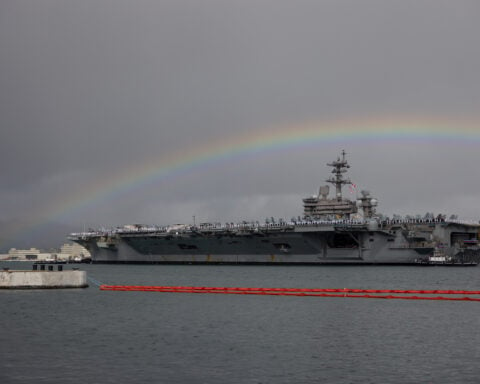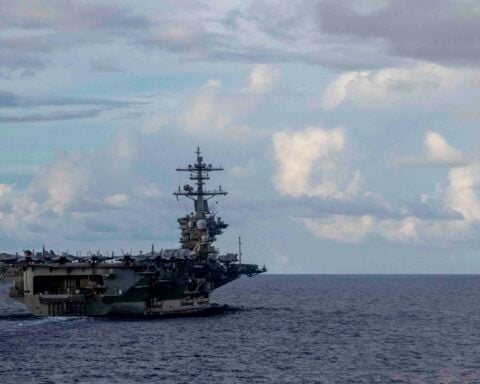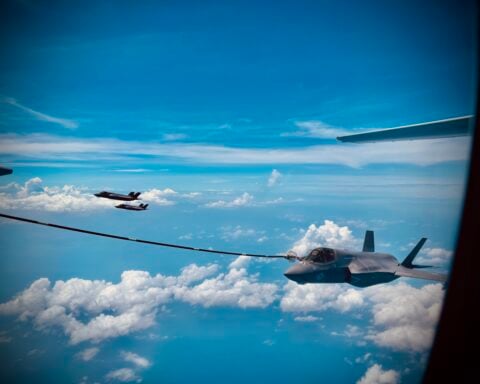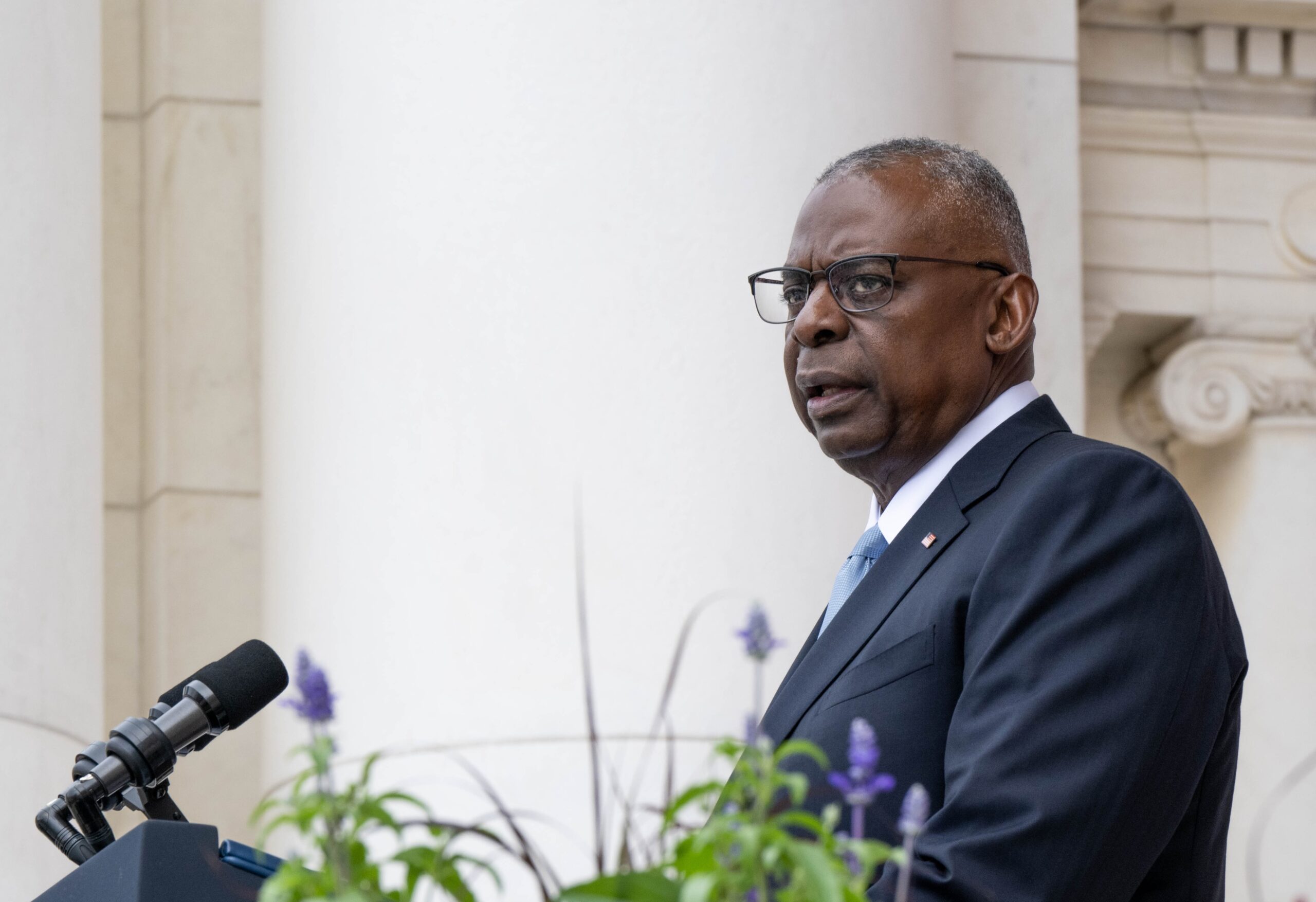
U.S. Secretary of Defense Lloyd Austin met in person for the first time Chinese Defense Minister Adm. Dong Jun on Friday in Singapore on the sidelines of the International Institute of Strategic Studies 2024 Shangri-La Dialogue, officials said.
The two defense chiefs discussed Taiwan and freedom of navigation in the South China Sea during the meeting. Also at the two-day conference, Philippine President Ferdinand Marcos Jr. criticized China for its actions in the South China Sea, but also said the U.S.-China rivalry is constraining the strategic choices of regional states and exacerbating flashpoints, creating new security dilemmas.
According to a Pentagon readout, Austin and Dong also discussed U.S.-China defense relations and regional and global security issues. Austin emphasized the importance of maintaining open lines of military-to-military communication between the United States and China. He reaffirmed the announcement by President Joe Biden and President Xi Jinping in November 2023 that both sides would resume telephone conversations between theater commanders in the coming months. Austin also welcomed plans to convene a crisis-communications working group by the end of the year.
Austin and Dong had only spoken via teleconference on Apr. 16, following a resumption of military talks between Washington and Beijing. Prior to Biden and Xi’s California meeting in November, China had previously refused any talks between Austin and then-Chinese Defense Minister Gen. Li Shangfu. China rebuffed a U.S. request for a meeting between Austin and Li at a previous Shangri-La Dialogue because of sanctions the United States imposed on Li in 2018. Li, who disappeared from public sight in August, was formally dismissed on Oct. 24, with some outlets reporting that he had been arrested for corruption. Dong was appointed defense minister on Dec. 29.
Austin “expressed concern about recent provocative PLA activity around the Taiwan Strait and reiterated that the PRC should not use Taiwan’s political transition – part of a normal, routine democratic process – as a pretext for coercive measures. The Secretary underscored that the United States remains committed to its longstanding one-China policy, guided by the Taiwan Relations Act, the Three U.S.-China Joint Communiques, and the Six Assurances. He also reaffirmed the importance of peace and stability across the Taiwan Strait,” the readout stated.
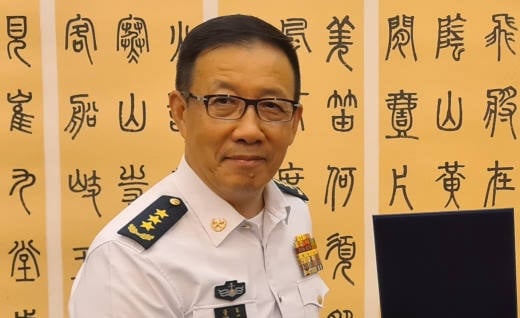
Austin emphasized the importance of respecting freedom of navigation guaranteed under international law – especially in the South China Sea.
He also discussed Russia’s war in Ukraine and China’s role in supporting Russia’s defense industrial base. He expressed concerns about recent provocations from North Korea, including its direct contributions to Russia’s ongoing assault on Ukraine.
Dong said that the healthy development of military relations between China and the United States is in the common interests of both sides and is the general expectation of the international community, according to a Chinese readout of the same meeting.
“The current situation of military relations between the two countries has not come easily. The two militaries should adhere to the bottom line of non-conflict and non-confrontation and truly serve as the stable cornerstone of the relationship between the two countries. The purpose of communication between the two militaries is to enhance understanding, eliminate misunderstandings, and accumulate mutual trust,” reads the Chinese readout.
Dong said that the Taiwan issue is purely China’s internal affair and that external forces have no right to interfere.
“China urges the U.S. to earnestly correct its mistakes and not to ‘use force to support independence’ in any way,” stated the readout.
“China’s attitude and bottom line are clear. We insist on equal consultation to resolve differences, but we will never ignore acts that intensify provocations.”
Also at the conference, Philippine President Marcos indirectly criticized China, stating that the Philippines and other Southeast Asian countries had a vision for peace, stability and prosperity in the South China Sea. He said this vision is being undermined by other actors, a veiled reference to China’s actions in the South China Sea, particularly around Philippine claims in the disputed Spratly Islands.“Illegal, coercive, aggressive and deceptive actions continue to violate our sovereignty, sovereign rights and jurisdiction,” said Marcos.
During the question and answer session, when asked if a red line would be crossed if a Chinese water cannon, which China Coast Guard ships often use to drive off Philippine ships, killed a Filipino. Marcos replied that such an action would be close to what the Philippines define as an act of war. “We would have crossed the Rubicon. Is that a red line? Almost certainly,” said Marcos, who added that the Philippines would respond accordingly.
Marcos also cautioned about the U.S.-China rivalry, stating it is “constraining the strategic choices of regional states.” He added that countries in the region should not have to choose between the two countries. “China’s influence over the security and economic evolution of this region is permanent, while the stabilizing presence of America is crucial to regional peace. It is never a choice. Both countries are important,” stated Marcos.


